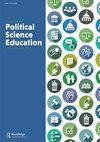欢迎来到加拿大政治:学生主导知识建设的合作
IF 0.6
Q3 POLITICAL SCIENCE
引用次数: 0
摘要
在2020年的冬天,我的加拿大政治导论班开始开发自己的在线、协作构建、开放获取的加拿大政治导论“教科书”。根据批判性教学法的原则,该作业要求学生进行小组合作,以生成简单的语言引子,这些引子可以与课堂以外的观众建立联系,同时有助于该领域的知识建设。一旦提交,学生的作品将被编译、编辑并上传到项目网站。学生有很多机会就他们的经历和整个项目提供反馈。自该项目于2020年试点以来,它已在加拿大的两个政治教室中使用了两次,并计划进一步扩大。本文记录了开发、修改和扩展项目的过程。它确定了任务背后的原则,以及项目到目前为止所面临的挑战。此外,利用学术研究表明,殖民主义、种族主义和边缘性仍然是加拿大政治研究的外围问题,它设想了一个由学生主导的、合作建立的在线“教科书”也可以用来挑战这一学科的历史界限。本文章由计算机程序翻译,如有差异,请以英文原文为准。
Welcome to Canadian Politics: Collaboration for Student-Led Knowledge Building
Abstract In the Winter of 2020, my introductory Canadian politics class started to develop its own online, collaboratively-built, open-access, introductory “textbook” on Canadian politics. Drawing on the principles of critical pedagogy, the assignment engages students in group work to generate plain-language primers that can connect with an audience beyond our classroom while contributing to knowledge-building in the field. Once submitted, students’ work is compiled, edited and uploaded to the project website. Students have multiple opportunities to provide feedback about their experience and the project as a whole. Since the project was piloted in 2020, it has been used twice more in two Canadian politics classrooms, with plans for further expansion. This article chronicles the process of developing, revising, and expanding the project. It identifies the principles behind the assignment, and the challenges the project has faced so far. Further, drawing on scholarship demonstrating that colonialism, racism, and marginality remain peripheral to the study of Canadian politics, it imagines how a student-led, collaboratively-built online “textbook” might also work to contest the historic boundaries of the discipline.
求助全文
通过发布文献求助,成功后即可免费获取论文全文。
去求助
来源期刊

Journal of Political Science Education
POLITICAL SCIENCE-
CiteScore
1.80
自引率
36.40%
发文量
69
期刊介绍:
The Journal of Political Science Education is an intellectually rigorous, path-breaking, agenda-setting journal that publishes the highest quality scholarship on teaching and pedagogical issues in political science. The journal aims to represent the full range of questions, issues and approaches regarding political science education, including teaching-related issues, methods and techniques, learning/teaching activities and devices, educational assessment in political science, graduate education, and curriculum development. In particular, the journal''s Editors welcome studies that reflect the scholarship of teaching and learning, or works that would be informative and/or of practical use to the readers of the Journal of Political Science Education , and address topics in an empirical way, making use of the techniques that political scientists use in their own substantive research.
 求助内容:
求助内容: 应助结果提醒方式:
应助结果提醒方式:


